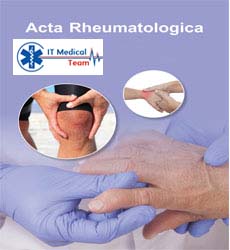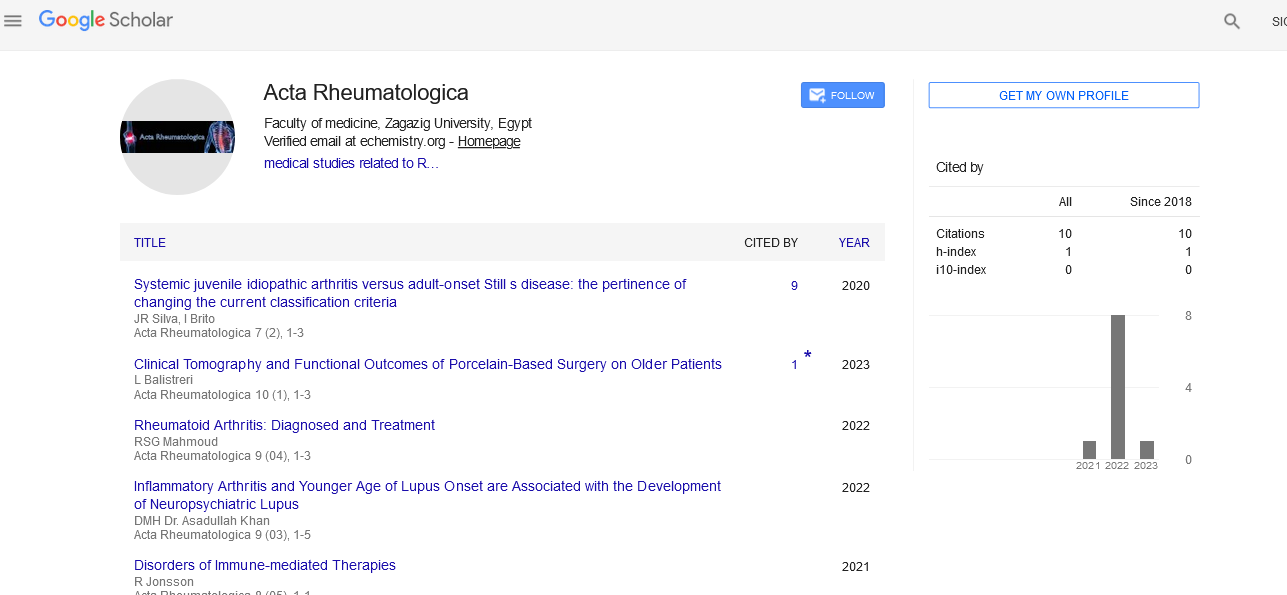Lindsay W. Victoria*
Cardiac Rehabilitation Institute, Leviev Heart Center, Sheba Medical Center, Israel
- *Corresponding Author:
- Lindsay W. Victoria
Cardiac Rehabilitation Institute, Leviev Heart Center
Sheba Medical Center, Israel.
E-mail: Victoria.lw@yahoomail.com
Received Date: October 15, 2021; Accepted Date: October 20, 2021; Published Date: October 25, 2021
Citation: Victoria LW (2021) Outbreak of Rheumatic Diseases in the COVID-19 Pandemic. Acta Rheuma. Vol.8 No.5:5.
Editorial
The underlying immunological abnormalities, comorbidities, and immunosuppressive therapy all contribute to an increased risk of viral infections in patients with autoimmune rheumatic disorders. Furthermore, immunocompromised influenza patients exhibited more severe illness, longer viral shedding, and higher antiviral resistance while displaying fewer clinical symptoms and indicators. COVID-19 is expected to follow the same detrimental path as other respiratory viral infections in individuals with autoimmune rheumatic illnesses, particularly those treated with immunosuppressive medications.
Despite the fact that the number of people infected with the severe acute respiratory syndrome coronavirus (SARS-CoV-2) has already surpassed two million and continues to climb in many countries, including Russia, little is known about the link between COVID-19 and inflammatory rheumatic disorders. In comparison to the general population, patients with chronic arthritis treated with biological and targeted synthetic disease modifying antirheumatic medications (DMARDs) do not appear to be at a greater risk of respiratory or life-threatening consequences from COVID-19. However, further information on the prevalence, severity, and consequences of COVID-19 in rheumatoid arthritis patients is urgently needed in order to identify individuals who are at higher risk and to influence therapeutic guidelines.
We looked at the frequency of autoimmune rheumatic illnesses in 902 ICU patients with SARS-CoV-2 pneumonia who needed noninvasive or invasive lung ventilation with or without inotropic assistance in a retrospective countrywide analysis. Medical records from all local COVID-19 hospitals across Russia were uploaded via the Internet to the Federal Center at Sechenov University in Moscow, which gave advice on antiviral therapy and critical care management, according to the government's decision. SARS-CoV-2 pneumonia, which had been suspected clinically, was confirmed by PCR and CT. SARS-CoV-2 pneumonia was defined as severe acute respiratory infection with typical CT findings (bilateral multilobar ground-glass opacification with a peripheral or posterior distribution, or multifocal consolidative opacities superimposed on ground-glass opacification, septal thickening, and development of a crazy paving pattern)5 and no other obvious aetiology in patients with inconclusive or pending PCR results.
However, demonstrates that despite their worry of getting COVID-19, the majority of rheumatic disease patients do not change their therapy. During the pandemic, a survey of 500 patients in Greece found that just 2.2 percent stopped taking disease-modifying antirheumatic medicines due to concerns about immunosuppression, which has been linked to chronic obstructive pulmonary disease and unemployment. To address this concern in our population, we conducted an anonymous electronic survey of consecutive patients of the outpatient rheumatology clinic in the Hospital Universitario (Monterrey, Nuevo León, Mexico), which serves a resource-limited population without access to health insurance, from five neighbouring states, to determine treatment adherence behaviours during the COVID-19 pandemic. Patients without an autoimmune disease diagnosis, those who were unaware of their medication and duplicates were removed from the study.
A decrease in serum IgG and an increased prevalence of some viral infections are linked to long-term RTX treatment of IRD. COVID-19, on the other hand, has a moderate clinical course in agammaglobulinaemia patients, suggesting that protection from severe COVID-19 may be independent of serum IgG. Our patients' serum IgG levels were always within acceptable ranges in this regard. The reduction of B cells and the use of prednisolone may have left our patients extremely immunocompromised (as part of the premedication in patient 1 and as part of the daily treatment in patient 2). The aggressive course of COVID-19 in individuals with common variable immunodeficiency, as well as the recent finding that glucocorticoids may increase the chance of requiring hospitalisation in patients with IRD infected with SARS-CoV-2, support this hypothesis.
41348





